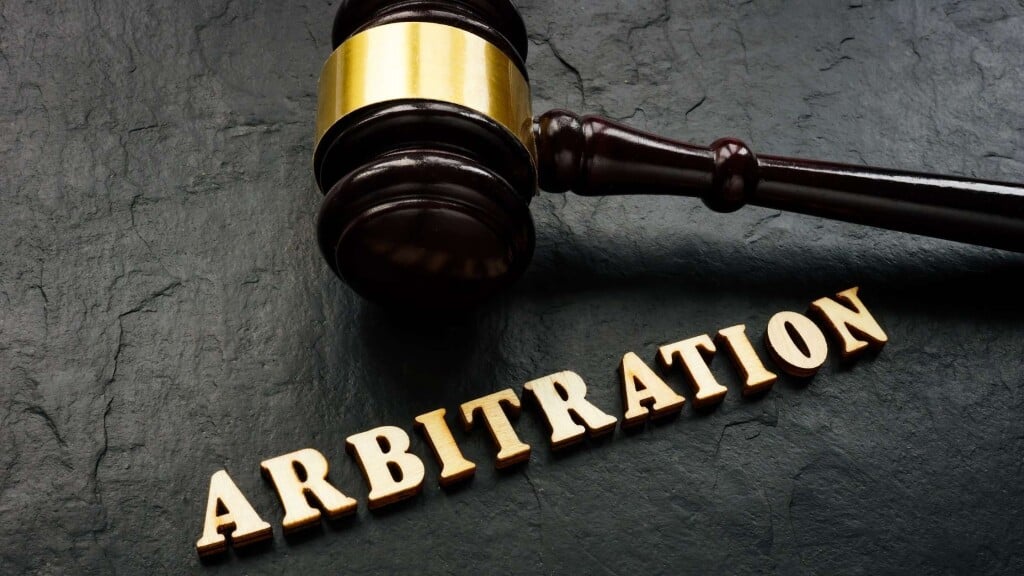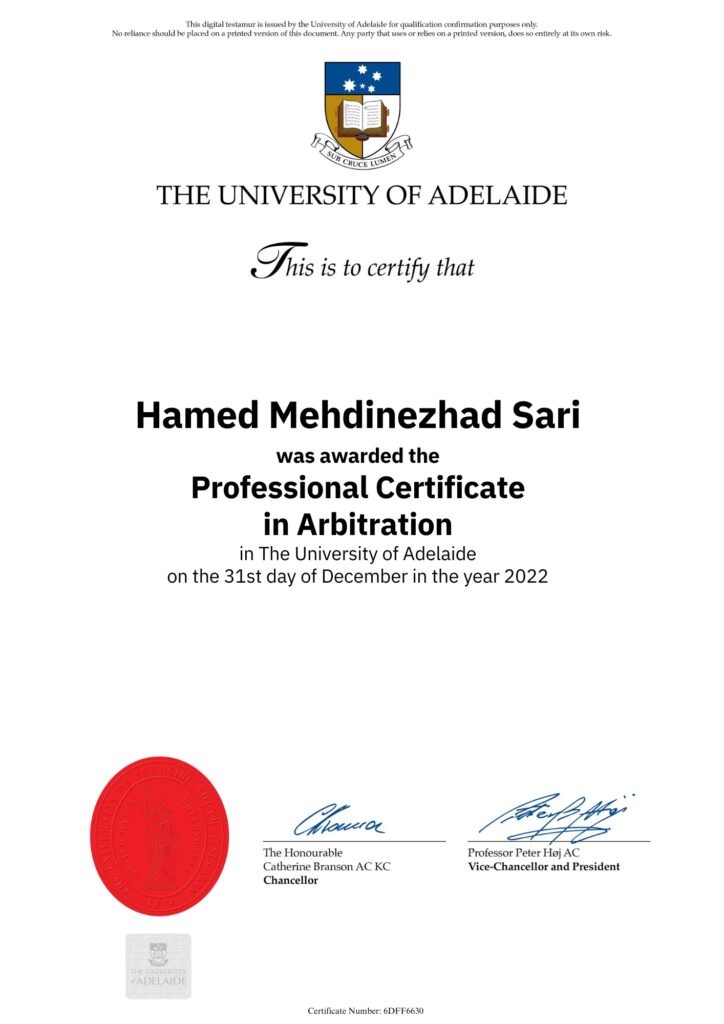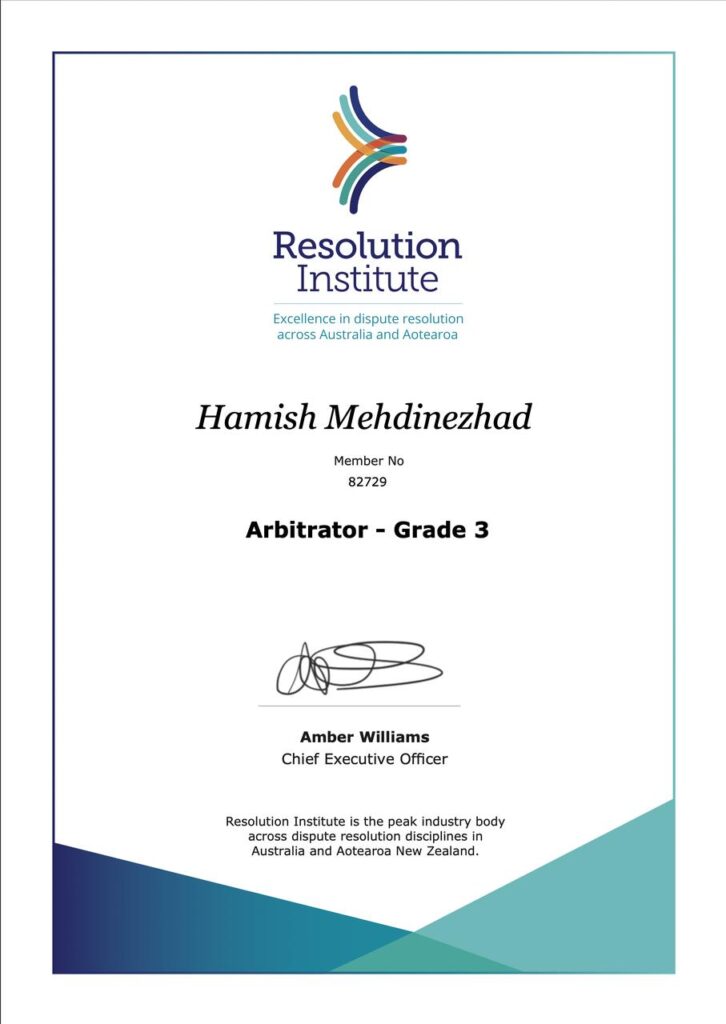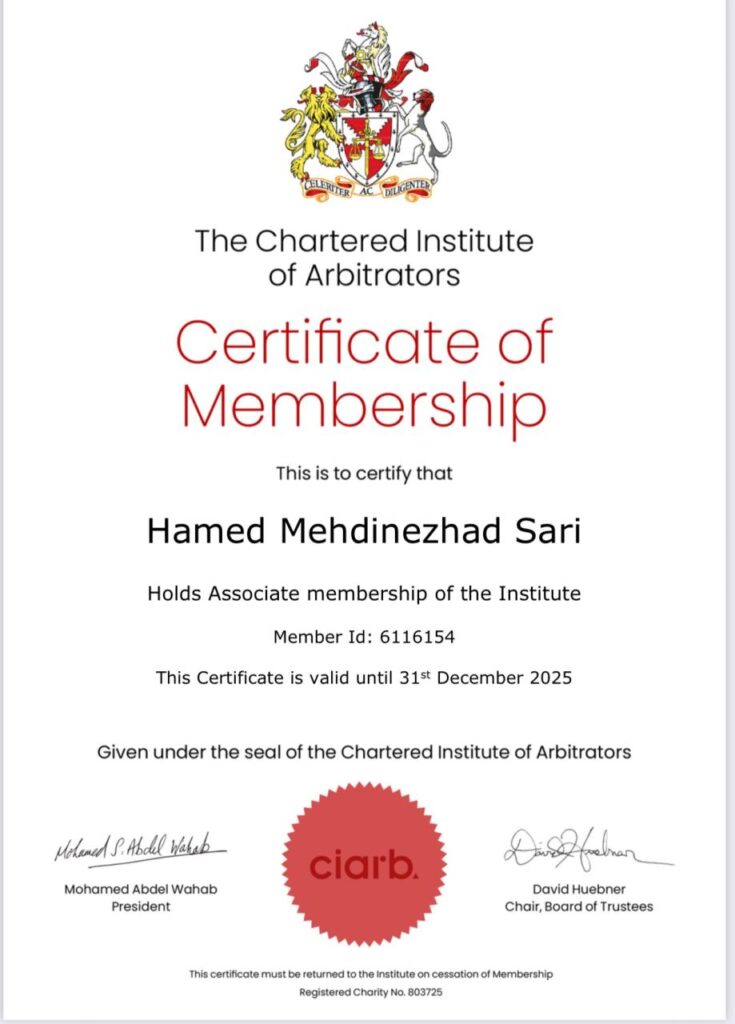
Key Benefits
Arbitration Process From Start To Finish
Initiation and Preliminary Stages
Hearing and Deliberation
Conclusion and Award Issuance

Agreement

Initiation

Planning

Hearings

Deliberation

Award
Definition: Arbitration is a method of dispute resolution where a neutral third-party, called an arbitrator, is appointed to resolve a dispute privately, outside of court. Significance: Offers a confidential, potentially quicker, and more flexible alternative to litigation.
Notice of Arbitration: A party initiates the process by submitting a Notice of Arbitration, detailing the nature of the dispute and the relief sought. Response: The opposing party provides a response, possibly including counterclaims, within a specified timeframe.
Selection Process: Parties either agree on a single arbitrator or, if no agreement is reached, an appointing authority might intervene. In some cases, a panel of three arbitrators might be chosen.
Impartiality: Appointed arbitrator(s) provide a declaration of impartiality, ensuring no conflicts of interest.
Initial Setup: An initial meeting sets the procedural rules, scope, and timeline for the arbitration.
Interim Measures: Temporary measures, if needed, are established to maintain the status quo.
Response: The respondent can provide an adjudication response, detailing reasons for withholding payment or disputing the claimed amount. Claimant’s Reply: If permitted, the claimant can submit a reply to the respondent’s response.
Documentary Evidence: Relevant documents supporting claims are submitted.
Witness and Expert Reports: When applicable, statements from witnesses and expert opinions are exchanged.
Presentations: Parties present arguments before the arbitrator(s).
Witness Examination: Witnesses can be examined and cross-examined.
Evidence Review: Arbitrator(s) scrutinize the submitted evidence.
Analysis: Arbitrator(s) review all materials and discussions.
Consultation: If multiple arbitrators are involved, they might convene for deliberation.
Decision: A written decision, or “award”, is provided, detailing the arbitrator(s) conclusions and any necessary remedies. Compliance: Parties are expected to adhere to the award.
Upholding the Award: If non-compliance occurs, the award can be enforced, often through national courts. Contesting: On specific grounds, a party might challenge the award within a limited timeframe.
Conclusion: The arbitration process concludes once the award is upheld, challenged, or any subsequent steps are exhausted. Post-Arbitration Confidentiality: All information remains confidential unless parties agree otherwise or disclosure is required by law.
Your Reliable Partner in Arbitration
Arbitration Defined:
Arbitration is a method of resolving disputes outside the traditional court system. In this process, parties involved in a dispute agree to submit their differences to an impartial individual or panel, known as the arbitrator or arbitration tribunal. This arbitrator or tribunal reviews the evidence, hears the arguments, and renders a decision, known as an “award.” Depending on the nature and terms of the arbitration agreement, this award can be binding or non-binding.
Key Differences Between Arbitration and Other Dispute Resolution Methods:
Formality Level:
Arbitration: It sits somewhere between informal negotiation and formal litigation. Though less formal than court proceedings, arbitration still follows a structured process.
Other Methods: Mediation, for instance, is often less structured and formal, with a neutral mediator assisting parties to reach a mutual agreement. Conversely, litigation in courts is usually more formal, involving strict rules of evidence and procedure.
Decision Making:
Arbitration: The arbitrator or arbitration tribunal has the authority to make a decision which can be binding or non-binding, depending on the parties’ agreement.
Other Methods: In mediation, the mediator does not decide the outcome; the parties do. In litigation, a judge or jury renders the decision.
Confidentiality:
Arbitration: Proceedings are usually private, and parties often agree to keep all discussions and decisions confidential.
Other Methods: Court trials are generally public. Mediation is also typically confidential, though the emphasis is more on collaboration than on adjudication.
Cost and Time Efficiency:
Arbitration: Often faster and less expensive than traditional litigation, but costs can escalate if multiple arbitrators are involved or if proceedings drag on.
Other Methods: Mediation can be quicker and more cost-effective than both arbitration and litigation, especially when parties are amenable to compromise. Litigation can be time-consuming and costly.
Finality:
Arbitration: Awards are typically final and binding, though there are limited grounds on which they can be challenged or set aside.
Other Methods: Court decisions can often be appealed, which might prolong the dispute. Mediation results in a mutually agreed-upon solution, but if no agreement is reached, parties can pursue other methods.
HMS Group Expertise:
While HMS Group is equipped to advise on various aspects of business and management solutions, it is essential to consult with legal experts or professionals specializing in dispute resolution to understand the best method suited for specific situations. Remember, the choice between arbitration and other dispute resolution methods will depend on the nature of the dispute, the preferences of the parties, and various other factors.
Deciding on the most appropriate method for resolving disputes is a crucial step. While arbitration offers various advantages, it might not be suitable for all situations. Here are some factors to consider to determine if arbitration is the right option for your dispute:
Nature of the Agreement:
Many commercial contracts include an arbitration clause specifying that any disputes arising from the agreement will be resolved through arbitration. If your contract has such a clause, parties are usually bound to that method, unless both agree to an alternative.
Desire for Confidentiality:
If privacy is a concern, arbitration, which is typically confidential, might be preferable over litigation, which is public.
Time Sensitivity:
Arbitration can be quicker than traditional court proceedings, making it a suitable choice if you want a more immediate resolution. However, it’s essential to note that complex cases or those involving multiple parties can prolong the arbitration process.
Cost Considerations:
While arbitration can be less expensive than litigation, costs can escalate, especially if proceedings become protracted or involve multiple arbitrators. You’ll need to weigh the potential costs against the benefits.
Complexity of the Issue:
Some technical or specialized disputes might benefit from arbitration, where parties can select an arbitrator with specific expertise in the matter.
Desire for Finality:</span<
Arbitration decisions are typically final and have limited grounds for appeal. If you’re looking for a definitive resolution without the possibility of extended appeals, arbitration might be the right choice.
Relationship with the Other Party:
If maintaining a good relationship is crucial, you might consider more collaborative methods, like mediation, where solutions are mutually agreed upon. Arbitration, being adjudicative, might be more adversarial.
Jurisdictional Concerns:
If parties are from different countries, arbitration can provide a neutral forum and process, potentially avoiding perceived biases of national courts.
Enforceability:
Arbitral awards are enforceable in many countries, especially those that are signatories to the New York Convention. If you’re concerned about enforcing a decision internationally, arbitration could be advantageous.
Flexibility:
Unlike court processes, parties in arbitration can often customize the procedure to some extent, which can be both an advantage and a challenge depending on the situation.
HMS Group Insight:
Every dispute is unique, and while arbitration is a powerful tool in many instances, it’s essential to evaluate all factors before making a decision. HMS Group recommends consulting with legal or dispute resolution professionals to ensure that the method you choose aligns with your specific needs and the nature of your dispute.
Arbitration has been growing in popularity as an alternative to traditional court litigation for various reasons. Here are some of the key advantages of choosing arbitration over going to court:
Speed of Resolution:
Arbitration proceedings can be notably faster than court litigation, especially when courts have significant backlogs. Parties can get a decision in months rather than the years it sometimes takes in court.
Cost-Effective:
Although arbitration can become expensive in some instances, it is often less costly than litigation, especially when considering long-term court fees, attorney fees, and the costs associated with delays in resolution.
Confidentiality:
Unlike court trials, which are usually public, arbitration proceedings and decisions are private. This confidentiality can be crucial for businesses and individuals who want to keep their disputes out of the public eye.
Expertise of the Arbitrator:
Parties can select an arbitrator with specific expertise relevant to their dispute. This can be especially beneficial for technical or industry-specific conflicts where specialized knowledge is essential.
Flexibility in Procedures:
Unlike the rigid procedures in court, parties can often customize the arbitration process to suit their needs, including setting timelines, choosing venues, and defining evidence rules.
Enforceability:
Thanks to international agreements like the New York Convention, arbitral awards are recognized and enforceable in many countries around the world, often more so than foreign court judgments.
Neutrality:
For cross-border disputes, arbitration provides a neutral ground, which can be crucial in avoiding perceived biases associated with one party’s home court advantage.
Finality:
Arbitration decisions are typically final, reducing the lengthy appeals process that can happen in the court system. While this ensures a quick resolution, parties must be confident in their choice of arbitration since there are limited grounds to overturn or appeal an arbitral award.
Preservation of Relationships:
While arbitration is still adversarial, it can be less confrontational than court litigation. The more private and streamlined process may help preserve business or personal relationships to a greater extent than a public trial.
Availability:
Courts might have limited availability or significant backlogs, leading to delays. Arbitration can often be scheduled at the convenience of the parties and the arbitrator, ensuring a more timely process.
HMS Group Perspective:
While the advantages of arbitration are numerous, it’s essential to weigh these against the specifics of your situation. Arbitration might be a powerful tool for many, but it’s crucial to make an informed choice. Always consider seeking advice from professionals to ensure that arbitration aligns with your dispute’s nature and your objectives.
Arbitration can be a versatile method of dispute resolution, suitable for various disagreements. While it’s not the best fit for every kind of conflict, the following types of disputes have traditionally been well-suited for arbitration:
Commercial and Business Disputes:
Many business contracts include arbitration clauses because it offers a confidential and efficient way to resolve disagreements related to contracts, mergers, acquisitions, or other business transactions.
International Disputes:
For parties from different jurisdictions, arbitration provides a neutral venue, making it a preferred choice for international commercial disagreements. The enforceability of arbitral awards in many countries due to the New York Convention also adds to its appeal.
Construction and Real Estate:
Disputes related to construction projects, including those about quality, timelines, or payment, can benefit from arbitrators with specific expertise in the construction and real estate sector.
Employment and Labor:
Some employment contracts include arbitration clauses to resolve disputes related to wrongful termination, discrimination, or wage issues, among others.
Intellectual Property:
Disputes regarding patents, trademarks, copyrights, or trade secrets can be complex and benefit from arbitrators with specialized knowledge in IP law.
Maritime and Shipping:
The maritime industry often prefers arbitration for its flexibility and the possibility to appoint arbitrators with specific expertise in maritime law.
Sports:
Disagreements between athletes, teams, agents, and associations can be settled privately and quickly through arbitration. For example, the Court of Arbitration for Sport (CAS) resolves many international sports-related disputes.
Consumer Disputes:
Some consumer contracts, like those for credit cards or telecommunication services, include arbitration clauses to resolve any disagreements between the service provider and the consumer.
Franchise Disputes:
Conflicts between franchisors and franchisees, whether related to fee structures, territorial rights, or other contractual terms, can often be arbitrated.
Technology and IT:
Disputes related to software licensing, IT services, or technology transfer agreements can benefit from arbitrators well-versed in tech and IT sectors.
HMS Group’s Takeaway:
It’s essential to remember that while arbitration can be advantageous for various disputes, the appropriateness of arbitration depends on the specifics of the disagreement and the goals of the parties involved. Arbitration might not be the best fit in cases where precedent-setting judgments are needed, or where parties want the right to a broad appeal. Always consult with legal professionals to understand the most suitable method for your particular dispute.
Selecting the right arbitrator is paramount to the arbitration process. A qualified and experienced arbitrator ensures that disputes are resolved fairly and competently. Here’s a step-by-step guide for those seeking an arbitrator in Australia:
National and Regional Arbitration Institutions:
Australian Centre for International Commercial Arbitration (ACICA):
ACICA is Australia’s principal arbitration institution. They have a list of qualified arbitrators specialized in various fields.
Resolution Institute:
This organization resulted from the merger of LEADR and IAMA and offers a list of arbitrators and other dispute resolution professionals in Australia.
Professional Associations and Groups:
Consider associations such as the Chartered Institute of Arbitrators (CIArb) Australia branch, which offers training and accreditation for arbitrators and has a directory of members.
Legal Directories:
Reputable directories, like the Australian Bar Association’s directory or the Law Council of Australia’s directory, can provide lists of barristers and lawyers who specialize in arbitration.
International directories such as Chambers and Partners or Martindale-Hubbell can also provide insights into experienced arbitrators in Australia.
Referrals:
Personal referrals from colleagues, attorneys, or business contacts can be invaluable. They can provide firsthand experience with specific arbitrators or institutions.
Academic Institutions:
Universities that offer law programs or courses in dispute resolution might have professors or experts who either act as arbitrators or can recommend qualified professionals.
Specialized Research:
If your dispute is industry-specific (e.g., construction or maritime), seek associations or groups specific to that industry. They might have arbitrators with specialized experience.
Interview Potential Arbitrators:
Once you have a list, consider interviewing potential candidates. This can give you an idea of their approach, experience, availability, and fee structure.
Check for Impartiality and Independence:
A cornerstone of arbitration is the impartiality of the arbitrator. Ensure your chosen arbitrator has no conflicts of interest regarding the parties or the subject matter.
Consider the Arbitrator’s Qualifications and Training:
Look for professionals with specific qualifications in arbitration or those who’ve undergone specialized training in the field.
HMS Group Advice:
Finding the right arbitrator is crucial to ensuring a smooth arbitration process. Always conduct thorough research, and consider consulting with legal experts or industry professionals in Australia to aid your search. The choice of an arbitrator can significantly impact the outcome, process, and overall experience of arbitration.
Arbitration is a structured yet flexible process that generally follows a series of steps. While the specifics can vary depending on the rules of the arbitration institution chosen, or the agreement of the parties, here is a typical overview of the arbitration proceedings:
Initiation of Arbitration:
Notice of Arbitration:
The party initiating the arbitration (claimant) submits a Notice of Arbitration, outlining the nature of the dispute, the relief sought, and the basis for the arbitral jurisdiction.
Appointment of Arbitrator(s):
Depending on the arbitration agreement, parties may select a sole arbitrator or a panel of arbitrators (usually three). If parties cannot agree on an arbitrator, the appointing authority or institution mentioned in the arbitration agreement will make the selection.
Response by the Respondent:
The party against whom the arbitration is initiated (respondent) provides a response or answer, outlining their version of the dispute and any counterclaims they might have.
Preliminary Meeting or Procedural Conference:
The arbitrator(s) may convene a preliminary meeting with the parties to establish procedural matters like timelines, exchange of evidence, potential hearing dates, and other logistical issues.
Documentary Exchange:
Parties exchange documents or evidence they intend to rely upon. The extent of this exchange will be governed by the rules of the arbitration or agreements made during the procedural conference.
Hearing:
A formal hearing takes place where both parties present their case. This may include opening statements, witness testimonies, expert reports, and closing arguments. Unlike court trials, arbitration hearings are private.
Post-Hearing Submissions:
Depending on the complexity of the case and the arbitrator’s discretion, parties might be asked to provide post-hearing briefs or submissions, elaborating on points made during the hearing or responding to specific queries.
Issuance of the Award:
After considering all evidence and arguments, the arbitrator or panel issues an award. The timeframe for this can vary, but most arbitration rules or agreements stipulate a period within which the award should be delivered.
Enforcement or Challenge:
If the award is binding, parties are expected to comply. If one party does not, the other can seek to enforce the award in a jurisdiction where the non-compliant party has assets. In some cases, if there are grounds, a party might challenge the arbitral award in a court. However, the grounds for such challenges are usually limited.
Closure:
Once the award is issued and any potential challenges are resolved, the arbitration process concludes.
HMS Group Perspective:
The arbitration process, while structured, offers flexibility allowing parties to tailor some procedures to their specific needs. This balance between formality and flexibility is one of the reasons why arbitration is chosen as a dispute resolution method. As always, understanding the process thoroughly and seeking expert guidance can ensure that you navigate arbitration effectively.
The length of the arbitration process can vary significantly based on various factors, making it challenging to provide a one-size-fits-all answer. However, to offer some perspective:
Simpler Cases:
For less complicated disputes, especially where there’s a sole arbitrator and limited evidence to be reviewed, the process can be completed in a matter of months.
Complex Cases:
More intricate disputes, especially those with multiple parties, extensive documentary evidence, or requiring specialist testimonies, might stretch the arbitration process to over a year or even longer.
Factors that can influence the duration of arbitration include:
Complexity of the Dispute: More complex issues will naturally take longer to address, as they might require detailed expert testimonies, extensive documentary evidence, and prolonged hearings.
Availability of Parties and Arbitrators: Scheduling can be a challenge, especially if there are multiple parties from different jurisdictions or if arbitrators are in high demand.
Procedural Choices: The procedural rules chosen, whether institutional (like those from ACICA or ICC) or ad-hoc, can influence the pace of the process. Some rules may have stricter timelines, while others offer flexibility.
Volume of Documentary Evidence: A significant amount of evidence will require more time for examination and analysis.
Number of Hearing Days: While some arbitrations might be resolved based on documentary evidence alone (document-only arbitration), others might require multiple days of hearings.
Post-Hearing Procedures: Depending on the case, there might be a need for post-hearing submissions or further clarifications, adding to the duration.
Deliberation Time: For panel arbitrations, where there are multiple arbitrators, deliberations might take longer, especially for complex matters.
HMS Group’s Insight:
While arbitration is often touted for its speed compared to traditional court litigation, it’s essential to manage expectations. The flexibility and private nature of arbitration can sometimes lead to longer durations, especially if parties don’t proactively manage the process. It’s crucial to discuss potential timelines with legal counsel or the chosen arbitral institution to have a realistic understanding of the expected duration.
Arbitration, while potentially more efficient than court litigation, still involves various costs. Here’s a breakdown of the typical expenses associated with the arbitration process:
Arbitrator’s Fees:
Arbitrators charge for their services, which can be based on hourly or daily rates, or sometimes as a percentage of the dispute’s value. If there’s a panel of arbitrators, costs will increase proportionally.
Institutional Fees:
If parties opt for institutional arbitration (e.g., through ACICA or ICC), the institution will charge administrative fees. These are often based on the dispute’s value or complexity.
Room and Facility Hire:
Hearings, meetings, or other arbitration-related events require venues. Costs might include room hire, audio-visual equipment, and other logistical arrangements.
Travel and Accommodation:
If parties, witnesses, experts, or arbitrators need to travel, there will be expenses for flights, local transport, meals, and accommodation.
Expert Witnesses:
Some disputes may require testimony from expert witnesses. These experts charge for their time, which includes preparation, reports, and actual testimony.
Legal Fees:
Parties will usually retain legal counsel to represent them in the arbitration. Legal fees can be significant, depending on the complexity of the case and the reputation of the firm or lawyer.
Translation and Interpretation:
For cross-border arbitrations, there might be a need for document translation or interpreter services during hearings.
Transcription Services:
Having a detailed record of hearings might require hiring a professional transcription service.
Post-Award Costs:
Enforcing or challenging an arbitral award in court might result in additional legal fees and court costs.
Miscellaneous Expenses:
This can include courier services, photocopying, binding, and other administrative expenses.
HMS Group’s Perspective:
While arbitration can be cost-effective compared to traditional court proceedings, the expenses can still add up. It’s essential to budget accurately and consider potential costs when deciding to pursue arbitration. Parties might also consider cost-saving measures, such as virtual hearings, to minimize expenses. Always seek guidance from professionals to gain a clear understanding of potential financial implications.
Yes, in most cases, the decision or “award” made by the arbitrator is legally binding on both parties. Here’s what you should know.
Binding Nature:
When parties agree to arbitration, typically through an arbitration clause in a contract or a separate arbitration agreement, they commit to being bound by the arbitrator’s decision. This commitment means that, in most jurisdictions, the parties cannot then appeal to a regular court if they disagree with the award, except on very limited grounds.
Enforceability:
Arbitral awards are enforceable in most countries, thanks to international conventions like the New York Convention (1958). Signatory countries to this convention have agreed to recognize and enforce arbitral awards rendered in other member states, making cross-border enforcement more straightforward.
Limited Grounds for Setting Aside:
While the award is binding, parties can challenge or seek to set aside the award in courts, but only on limited grounds. These might include procedural irregularities, arbitrator bias, or if the award violates public policy.
Consensual Exceptions:
In some instances, parties might agree to “non-binding” arbitration as a means to understand a neutral third-party’s perspective on the dispute. However, this approach is less common and would need explicit agreement by both parties beforehand.
HMS Group’s Insight:
The binding nature of arbitration is one of its defining features, ensuring that once a dispute goes through this process, it achieves a sense of finality. However, it’s crucial to enter arbitration with a clear understanding of its binding implications, ensuring that it aligns with the objectives of both parties. When drafting or entering into agreements, always consult legal expertise to fully grasp the consequences of the arbitration clause or provision.
Yes, parties are generally allowed and often choose to have legal representation during arbitration proceedings. Here’s what you should know.
Right to Representation:
In most arbitration proceedings, whether institutional or ad-hoc, parties have the right to be represented by legal counsel or another representative of their choice. This right ensures that parties can adequately present their case and protect their interests.
Choice of Representative:
Parties can select a lawyer from their home jurisdiction or any other jurisdiction, depending on the arbitration rules and any applicable laws. This flexibility allows parties to choose representatives with specific expertise or familiarity with the subject matter of the dispute.
Notification:
Parties are typically required to notify the other party and the arbitral tribunal about their chosen representative, ideally well in advance of any hearings or substantive interactions.
Possible Restrictions:
While the right to representation is standard, there might be specific restrictions or guidelines, especially in domestic arbitrations. Some jurisdictions or specific arbitration rules might have provisions regarding who can act as a representative, so it’s essential to check any applicable rules or laws.
Cost Implications:
Engaging legal representation will entail legal fees, which can vary based on the lawyer’s or firm’s reputation, the complexity of the case, and the duration of the arbitration. Parties should factor these costs when considering arbitration as a dispute resolution method.
HMS Group’s Perspective:
Legal representation in arbitration can be invaluable, providing expertise, strategic direction, and ensuring that parties’ rights and interests are robustly presented and defended. While parties can represent themselves, the complexities and nuances of arbitration often make professional representation advisable. Always consult with potential representatives early in the process to understand their approach, experience, and cost structure.
Absolutely, arbitration is not only suitable for domestic disputes but is also a preferred method for resolving international disputes, especially in commercial matters. Here’s why.
Neutrality:
For parties from different countries, choosing a neutral forum can be critical. Arbitration allows parties to select a neutral venue and arbitrators, ensuring that no party has a “home court” advantage.
Flexibility:
Parties can choose the procedural rules, language, and location of the arbitration, tailoring the process to their needs and ensuring clarity for all involved.
Confidentiality:
International disputes can sometimes involve sensitive business information. Arbitration proceedings are private, helping to protect the confidentiality of the matters discussed.
Enforceability:
Thanks to the New York Convention (1958), which has been ratified by over 160 countries, arbitral awards from international disputes are easily enforceable in member countries. This global recognition makes arbitration attractive for international parties, providing assurance that the award can be executed in multiple jurisdictions.
Expertise:
Parties can select arbitrators with specific expertise in international law or the particular subject matter of the dispute, ensuring that the nuances of cross-border matters are thoroughly understood.
Cultural Sensitivity:
Arbitration allows for a process that can accommodate different cultural approaches to dispute resolution, potentially making the process smoother for all parties involved.
HMS Group’s Insight:
The rise of globalization has led to an increase in cross-border transactions and, consequently, international disputes. Arbitration has emerged as a leading solution to handle these disputes, offering a balanced, flexible, and enforceable approach. For businesses and individuals involved in international dealings, understanding the value and mechanics of international arbitration is paramount. Always consult with experts who have a track record in international arbitration to navigate its intricacies effectively.
One of the hallmarks of arbitration is its promise of confidentiality, making it an attractive option for many parties, especially in sensitive disputes. Here’s an overview of the confidentiality aspects in arbitration.
Inherent Confidentiality:
Unlike court trials, which are usually public, arbitration proceedings are private. Only the parties, their representatives, the arbitrators, and any other persons agreed upon (like expert witnesses) typically attend the hearings.
Protection of Sensitive Information:
The confidential nature of arbitration can be particularly beneficial for disputes involving trade secrets, proprietary business practices, or any other sensitive information.
Agreements and Rules:
While many arbitration rules or laws inherently provide for confidentiality, parties often bolster this with explicit confidentiality agreements to ensure all involved understand and commit to the requisite levels of discretion.
Limits to Confidentiality:
It’s important to note that there might be situations where confidentiality could be limited. For instance, if a party needs to enforce or challenge an award in court, some details of the arbitration might become public. Additionally, in some jurisdictions, specific types of disputes (e.g., those involving public interest matters) may have different confidentiality standards.
Third Parties:
While the main parties and the arbitrators are typically bound by confidentiality, third parties like expert witnesses or transcriptionists may not be inherently bound unless explicitly agreed upon.
Data Protection:
With the rise of digital communication and storage, ensuring the secure and confidential handling of electronic data during arbitration is also paramount. Parties should consider data protection measures and possibly address them in confidentiality agreements.
HMS Group’s Insight:
Confidentiality is a significant advantage of arbitration, especially for parties keen on keeping the details of their dispute and its resolution away from public view. However, understanding the nuances and potential limits of confidentiality is crucial. Parties should consult with legal professionals to draft comprehensive confidentiality agreements and ensure they’re navigating the process in a way that maximizes discretion and protection.
When one party refuses to participate in arbitration, it can pose challenges, but the process is designed to handle such scenarios. Here’s what typically happens.
Commencement Still Possible:
If one party refuses to participate or is unresponsive after the commencement of arbitration, the process can generally still proceed. Arbitration rules often have provisions that allow for the continuation of proceedings even in the absence of one party, as long as the initiating party can prove that proper notice was given.
Appointment of Arbitrator(s):
In cases where the non-participating party fails to appoint an arbitrator (in scenarios where each party appoints one), many arbitration rules provide mechanisms to ensure an arbitrator is appointed on their behalf. This could be done by the other party, an arbitral institution, or another designated authority.
Awards in Absentia:
If a party continues to refuse participation, the arbitrator(s) can issue an award based on the evidence presented by the participating party. However, arbitrators are still obligated to ensure that the award is made in compliance with the applicable laws and is based on the evidence and arguments presented.
Enforceability:
An award rendered when one party refuses to participate is generally still enforceable. The key is to ensure that the non-participating party was given proper notice and had an opportunity to participate.
Defenses in Enforcement:
While awards in absentia are enforceable, the non-participating party might attempt to challenge the award’s enforcement by claiming they weren’t given proper notice or that they were unable to present their case. It emphasizes the importance of following procedural rules and documenting all communication.
HMS Group’s Insight:
Refusal to participate in arbitration by one party, while challenging, does not stall the process. Arbitration is designed to provide a resolution even in such scenarios. However, it’s crucial for the participating party to strictly adhere to the rules and ensure all procedural safeguards are in place. This not only ensures the validity of the arbitral award but also strengthens its enforceability in the face of potential challenges. As always, seeking expert guidance in such situations can be invaluable.
Arbitration is designed to provide a final and binding resolution to disputes. However, the question of appeal is a nuanced one. Here’s what you need to understand about appealing an arbitral award.
Limited Grounds for Appeal:
Unlike court judgments, which can often be appealed on substantive matters, the grounds for challenging or appealing an arbitral award are limited. Typical grounds include procedural irregularities, arbitrator bias, the award being in conflict with public policy, or if the arbitrator ruled on matters outside of their jurisdiction.
Setting Aside vs. Appeal:
In most legal systems, parties can’t directly appeal an arbitral award on its merits. Instead, they might seek to “set aside” or “vacate” the award. This action doesn’t involve a review of the case’s facts but focuses on whether the arbitration process was fundamentally fair and in line with the agreed-upon procedure.
Institutional Rules:
Some arbitral institutions offer an internal appellate mechanism, allowing for a review of the award by a separate panel within the institution. If parties foresee the potential need for an appeal, they can consider choosing such institutions and including appropriate provisions in their arbitration agreement.
Enforcement Stage:
A party that’s unsatisfied with an award might resist its enforcement in a jurisdiction where the other party seeks to enforce the award. Here, they might bring up grounds similar to those for setting aside the award.
Consent to Appeal:
In some jurisdictions, if both parties agree, they can create a mechanism in their arbitration agreement to allow for appeals on certain grounds. However, this approach is less common and must be explicitly agreed upon.
HMS Group’s Insight:
The limited appealability of arbitral awards is both a strength and a challenge of the arbitration process. It ensures speedy resolution and finality but may leave parties feeling they have limited recourse if unsatisfied with the decision. Parties should carefully draft their arbitration agreements, possibly with provisions that address potential dissatisfaction, and always consult with legal experts to understand their rights and avenues for recourse post-arbitration.
Arbitration offers a wide range of remedies to resolve disputes, much like traditional court systems. However, there are some boundaries on what arbitrators can award. Let’s delve into the scope and limitations of remedies in arbitration.
Commonly Awarded Remedies:
Monetary Damages: Compensation for losses suffered.
Specific Performance: Ordering a party to fulfill a contractual obligation.
Injunctions: Directives that prevent a party from doing something.
Declaratory Relief: A statement on the rights of parties without necessarily ordering any further action.
Based on Agreement and Law:
Arbitrators must base their decisions on the parties’ agreement and the governing law. If an agreement or applicable law doesn’t allow for a specific remedy, an arbitrator typically can’t award it.
Punitive Damages:
While some legal systems and certain arbitration rules allow arbitrators to award punitive or exemplary damages (intended to punish and deter wrongful conduct), others don’t. The permissibility of such damages depends on the governing law and the parties’ agreement.
Limitations in International Arbitration:
In international disputes, remedies might be influenced by international conventions, treaties, or the laws of multiple jurisdictions. This can add complexities in determining permissible remedies.
Jurisdictional Concerns:
The enforceability of certain remedies might be uncertain, especially in cross-border situations. For instance, an award that’s enforceable in one country may face challenges in another due to differences in legal systems or public policy concerns.
Agreed Limitations:
Parties can limit the scope of potential remedies in their arbitration agreement. For example, they might agree to exclude certain damages or set caps on potential awards.
HMS Group’s Insight:
While arbitration offers a broad spectrum of remedies to address disputes, understanding the inherent and agreed-upon limitations is essential. This ensures realistic expectations and effective crafting of arbitration agreements. Always consult with legal professionals when drafting or entering into arbitration agreements to ensure the potential remedies align with your interests and objectives.
Arbitration Credentials
Professional Certificate in Arbitration – University of Adelaide
Hamish was awarded the Professional Certificate in Arbitration by the University of Adelaide on 31 December 2022. This formal academic qualification reflects his in-depth understanding of arbitration processes, legal frameworks, and dispute resolution principles. Completing this program at one of Australia’s leading institutions strengthens Hamish’s credentials as a practitioner who combines academic excellence with practical experience in managing complex commercial and construction disputes.
Arbitrator – Grade 3 (Resolution Institute)
Hamish is recognised as a Grade 3 Arbitrator by the Resolution Institute, the leading membership body for dispute resolution professionals across Australia and Aotearoa New Zealand. As a certified member (No. 82729), Hamish is formally acknowledged for his capability in conducting arbitration proceedings with impartiality, competence, and adherence to high ethical standards. This recognition underscores his commitment to resolving complex disputes effectively through structured, fair, and independent arbitration processes.
Associate Member – Chartered Institute of Arbitrators (CIArb)
Hamish holds Associate Membership with the Chartered Institute of Arbitrators (CIArb), a globally respected organisation committed to setting high standards in alternative dispute resolution. As an Associate Member (ID: 6116154), Hamish is recognised for his foundational expertise and dedication to the principles of arbitration and ethical dispute resolution. This membership signifies his alignment with international best practices and his ongoing commitment to professional development in the field of arbitration.
Professional Member – Dispute Resolution Board Foundation (DRBF)
Hamish is a full professional member of the Dispute Resolution Board Foundation (DRBF), the leading global organisation promoting the use of Dispute Boards to prevent and resolve disputes in major infrastructure and construction projects. As an Industry Partner Contact since 4 August 2025 (Member No. 5672), Hamish contributes to the advancement of collaborative dispute resolution methods that align with international best practices. His involvement with DRBF highlights his commitment to proactive, consensus-driven approaches in complex project environments.








